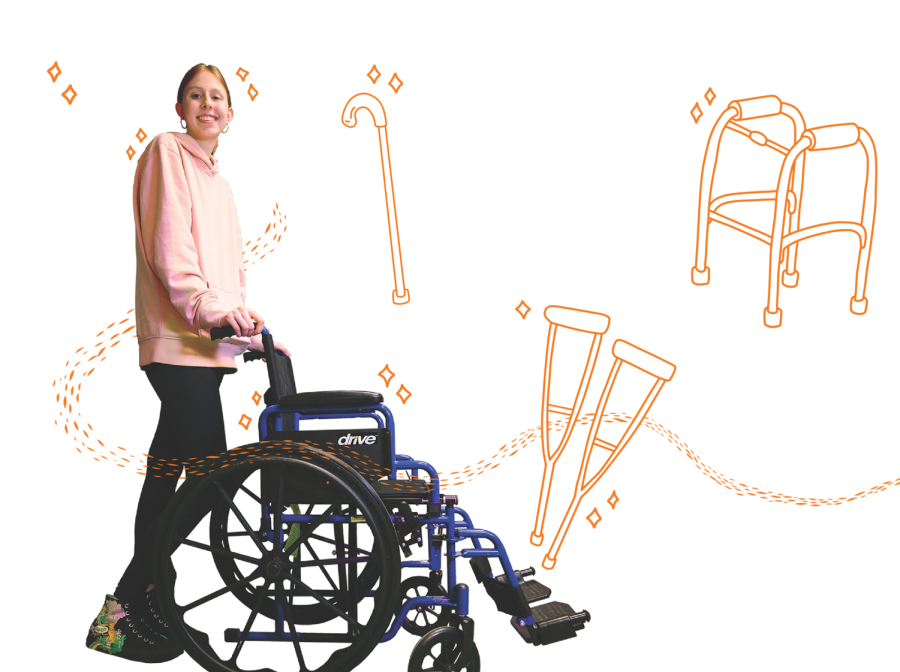Yes, I can walk
Gabriella Esch ’23 reflects on her experiences using mobility aids at West High.
Gabriella Esch ’23 started using mobility aids her junior year of high school.
May 11, 2023
“You’re too young to be sick” are words I’ve heard fairly often. I have something referred to as a “dynamic disability.” This means my symptoms can vary greatly, from experiencing mild joint pain to being unable to stand and having joints dislocate on a whim. I began to use mobility aids such as canes and crutches last year. It was frustrating at first, not being able to depend on my body as much as I used to, but after a few months, I realized that it’s okay to need help. My aids allow me to participate when I am struggling and give me a new degree of freedom. However, the reactions from other people have been mixed.
I receive my fair share of back-handed comments, especially since I started using a wheelchair this year as I’ve struggled to walk reliably. I don’t think people realize that not everybody who uses a wheelchair can’t walk. I am what is called an “ambulatory wheelchair user,” or an individual who uses a wheelchair but can still walk. I’ve had people tell me that if they could use a wheelchair, they would never walk again. That’s not how I see it. On the days I need a wheelchair, it’s because I’m in too much pain to walk. On those days, there is nothing I want more than to be able to walk without pain.
In some ways, using a wheelchair is more difficult than walking. Trying to navigate the hallways at a seated level is very overwhelming. Not only do I get bumped into and barely have enough space to maneuver, but also have to worry about doors. West High isn’t as accessible as you may expect, even though they follow all the legal requirements for accessibility. Only the main door has a handicap door button; the office doors and bathrooms don’t. The elevators are inconveniently located, so it can take me a lot longer to get to classes. I didn’t notice until my mobility got worse, but a lot of classrooms aren’t organized in a way that can allow wheelchairs through either.
When I have to ask teachers or other students to help me move desks so I can get to my seat, I feel like an inconvenience. The world tends to be designed with able-bodied people in mind. My need for mobility aids can make me feel like I’m making things more difficult, when in reality, I’m just trying to do normal things such as go to class or roam around downtown. Whenever that happens, I remind myself that I deserve to take up space and have access to the resources I need; it’s not shameful to need extra help. Using mobility aids, especially as a teenager, has been stigmatized. I’ve had multiple people, both kids and adults, tell me that I’m “just being lazy” and I “don’t look sick.” People need to recognize that there is no “right age” to need mobility aids. Harmful comments like these can discourage people like me from using mobility aids even though they help control pain and provide support.
It doesn’t stop at negative comments. I’ve also noticed that a fair number of students don’t understand mobility aid etiquette. This is understandable because the majority of students haven’t had to use them before, but some things should be common sense. One important part of mobility aid etiquette is that you shouldn’t touch other people’s mobility aids unless they ask for help. The first day I was using my wheelchair, I remember someone came up behind me, grasped the wheelchair’s handles and started pushing me. It wasn’t even someone I knew. Grabbing someone’s mobility aids is similar to taking someone by the hand and forcefully dragging them somewhere. You would never do that to someone you don’t know, so why would you do it to a wheelchair user? We deserve the same respect as everyone else.
There seems to be a misconception that young individuals who use mobility aids do it for attention. We’ve all heard the bit about the girl who always seems to have something new wrong. Well, I’ve realized I am that girl, and there’s nothing wrong with that. I’ve come to accept that my ways of getting around may need to be a bit different than others, but that’s just because I’m taking care of my body and giving it the help it needs. You should take into account that every brace, mobility aid and accommodation is there for a reason. It is so frustrating to always have something wrong, but that’s just how it goes for me. I would so much rather have a working body than attention. In fact, it actually took me until my junior year to be able to wear my braces and use mobility aids openly because I was scared of people questioning if I was faking. I was scared of the attention I would get. I didn’t want to become that girl who always had something new wrong and a thousand different braces, but there should be no shame in that. Everyone deserves access and respect, regardless of the accommodations they need to get through the day.







